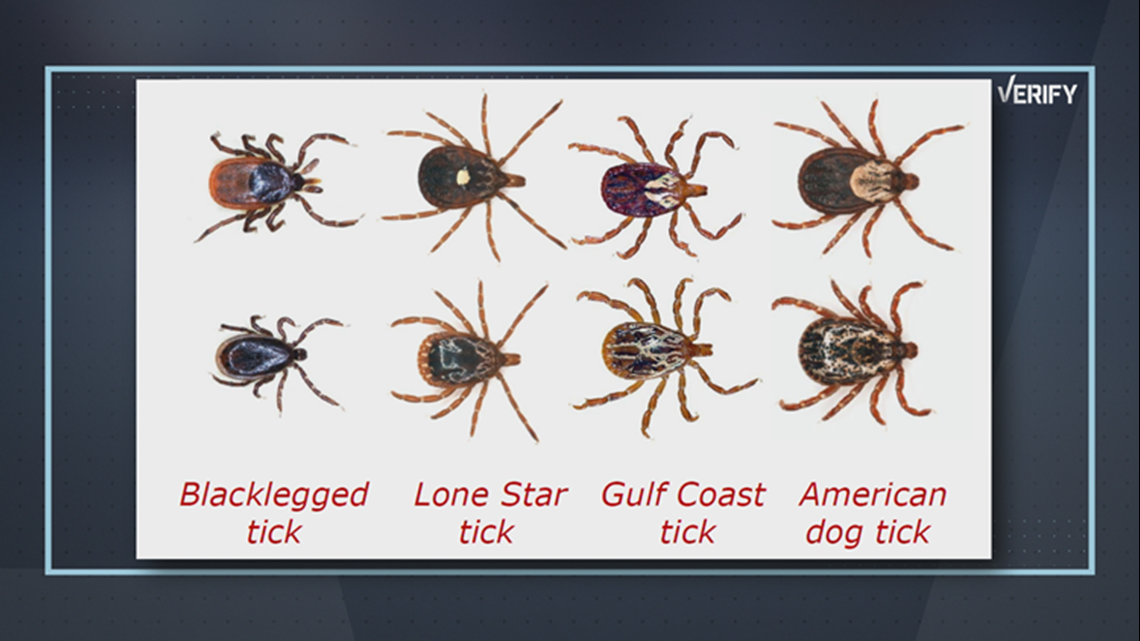After a relatively mild winter, tick experts are warning the tick population could boom this year.
Harsher winters typically help reduce the tick population, but this year was practically balmy as far as East Tennessee winters go -- with plenty of rain to boot.
"Rainfall in the summertime appears to be a positive correlation," says Dr. T.J. Jones at East Tennessee State University. "As long as you're not in an extreme drought, the tick population will be happy."
In 2017 -- the CDC said there were a record number of nearly 60,000 cases of tick-born illnesses, which was up substantially from nearly 49,000 cases in 2016.
A majority of those cases were Lyme Disease, which is contracted from black-legged deer tick bites. Tennessee had 15 confirmed cases of Lyme Disease in 2017 and another 32 probable cases.
The infection causes flu-like symptoms shortly after being bitten. In some chronic cases, it can cause neurological issues.
While the state has a few dozen confirmed cases over the past few years, health officials maintain Lyme disease is not considered endemic in Tennessee yet -- meaning the infections are few and spread out.
The endemic region remains in the northeast and mid-Atlantic region where deer ticks thrive -- particularly from Northeast Virginia to Maine, as well as some northern states such as Wisconsin and Minnesota.
Still, public health officials and tick experts warn people across the Southeast to remain on the alert for deer tick bites, as the infection region has been spreading further south.
“I feel like we’re right on the edge of Lyme disease distribution,” UT researcher Graham Hickling said in 2017. “It could hit in several years.”
For Tennesseans, the greatest concerns remain the American dog tick and the Lone Star tick -- which spread diseases that are more prevalent in the state.


The dog tick carries Rocky Mountain Spotted Fever, which can be deadly if not treated with antibiotics. RMSF is a rare bacterial disease which normally causes fever, headache, rash, vomiting, muscle pain, and lack of appetite. The good news -- according to a University of Tennessee professor-- is RMSF is only carried by about 3-5% of these ticks in Tennessee.
Lone Star ticks carry the infamous 'red meat allergy' sugar molecule known as Alpha-gal. As the name suggests, a bite from a dog tick carrying the molecule can cause a person to develop Alpha-gal syndrome, which is a food allergy for red meat specifically -- including hives, swelling, wheezing or shortness of breath, runny nose, abdominal pain, diarrhea, vomiting, headaches, and even anaphylaxis, which is a deadly allergic reaction.
Health officials also warn the Lone Star tick can also transmit Ehrlichiosis, which causes flu-like symptoms 1-2 weeks after the bite.
One other tick to be on the lookout for -- the Gulf Coast tick. It's not found in East Tennessee, but can be found in the Southwestern portion of the state near Memphis.
Gulf Coast ticks carry another type of spotted fever closely related to Rocky Mountain spotted fever known as Rickettsia Parkeri. It's not as common but includes similar symptoms such as fever, headache, and rash.
Tick experts recommend several practices to avoid tick-borne disease:
1. Use a bug spray with 20-30% DEET on exposed skin, and consider spraying clothing with permethrin.
2. Avoid tall grass, brush and overhanging limbs. When hiking, stick to the center of the trail.
3. Tuck pants into boots or socks
4. Perform a tick check every night and remove any embedded critters as soon as possible with tweezers. The less time a tick is attached, the lower the infection risk.


